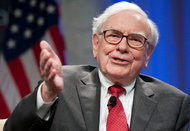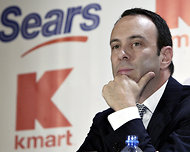Results beat expectations, and were released after Berkshire shares earlier in the day closed at a record high. On Saturday, Warren E. Buffett, the company’s chairman, and Charlie Munger, the vice chairman, will field shareholder questions at the company’s annual meeting in its hometown, Omaha.
Net income increased to $4.89 billion, or $2,977 per Class A share, from $3.25 billion, or $1,966 a share, a year earlier. Operating profit increased 42 percent to $3.78 billion, or $2,302 a share, from $2.67 billion, or $1,615 a share.
Revenue rose 15 percent from a year ago to $43.87 billion.
Analysts on average expected profit of $1,996 a share, according to Thomson Reuters.
Book value a share, Mr. Buffett’s preferred measure of growth, increased 5.5 percent from year end to $120,525 per Class A share, and Berkshire’s cash stake grew over that period to $49.09 billion from $46.99 billion.
About $12 billion of cash is being used to finance a purchase by Berkshire and Brazil’s 3G Capital of the ketchup maker H. J. Heinz.
Operating profit from insurance operations, including the Geico car insurance and General Re reinsurance businesses, doubled to $1.7 billion from $845 million.
Nearly all of the improvement came from underwriting, where profit rose to $901 million from $54 million, in part because of a $255 million pretax gain in its reinsurance business.
Operating profit from noninsurance business rose 12 percent to $2.25 billion from $2 billion.
Berkshire owns more than 80 business units that sell things like athletic apparel, chemicals, furniture and ice cream. It also owns tens of billions of dollars of common stocks like Coca-Cola, International Business Machines and Wells Fargo.
In trading on Friday, Berkshire Class A shares closed up $2,047, or 1.2 percent, at $162,904. Its Class B shares closed up $1.34, or 1.2 percent, at $108.64.
Article source: http://www.nytimes.com/2013/05/04/business/berkshire-hathaway-profit-rises-51.html?partner=rss&emc=rss







